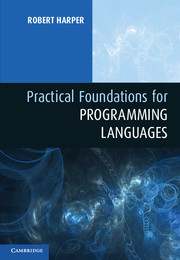Book contents
- Frontmatter
- Contents
- Preface
- Part I Judgments and Rules
- Part II Statics and Dynamics
- Part III Function Types
- Part IV Finite Data Types
- Part V Infinite Data Types
- Part VI Dynamic Types
- Part VII Variable Types
- Part VIII Subtyping
- Part IX Classes and Methods
- Part X Exceptions and Continuations
- Part XI Types and Propositions
- Part XII Symbols
- Part XIII State
- Part XIV Laziness
- Part XV Parallelism
- Part XVI Concurrency
- 41 Process Calculus
- 42 Concurrent Algol
- 43 Distributed Algol
- Part XVII Modularity
- Part XVIII Equational Reasoning
- Part XIX Appendix
- Bibliography
- Index
41 - Process Calculus
from Part XVI - Concurrency
Published online by Cambridge University Press: 05 February 2013
- Frontmatter
- Contents
- Preface
- Part I Judgments and Rules
- Part II Statics and Dynamics
- Part III Function Types
- Part IV Finite Data Types
- Part V Infinite Data Types
- Part VI Dynamic Types
- Part VII Variable Types
- Part VIII Subtyping
- Part IX Classes and Methods
- Part X Exceptions and Continuations
- Part XI Types and Propositions
- Part XII Symbols
- Part XIII State
- Part XIV Laziness
- Part XV Parallelism
- Part XVI Concurrency
- 41 Process Calculus
- 42 Concurrent Algol
- 43 Distributed Algol
- Part XVII Modularity
- Part XVIII Equational Reasoning
- Part XIX Appendix
- Bibliography
- Index
Summary
So far we have mainly studied the statics and dynamics of programs in isolation, without regard to their interaction with the world. But to extend this analysis to even the most rudimentary forms of input and output requires that we consider external agents that interact with the program. After all, the whole purpose of a computer is, ultimately, to interact with a person!
To extend our investigations to interactive systems, we begin with the study of process calculi, which are abstract formalisms that capture the essence of interaction among independent agents. The development will proceed in stages, starting with simple action models, then extending to interacting concurrent processes, and finally to synchronous and asynchronous communication. The calculus consists of two main syntactic categories, processes and events. The basic form of process is one that awaits the arrival of an event. Processes are closed under parallel composition (the product of processes), replication, and declaration of a channel. The basic forms of event are signaling on a channel and querying a channel; these are later generalized to sending and receiving data on a channel. Events are closed under a finite choice (sum) of events. When enriched with types of messages and channel references, the process calculus may be seen to be universal in that it is at least as powerful as the untyped λ-caclulus.
- Type
- Chapter
- Information
- Practical Foundations for Programming Languages , pp. 347 - 362Publisher: Cambridge University PressPrint publication year: 2012

